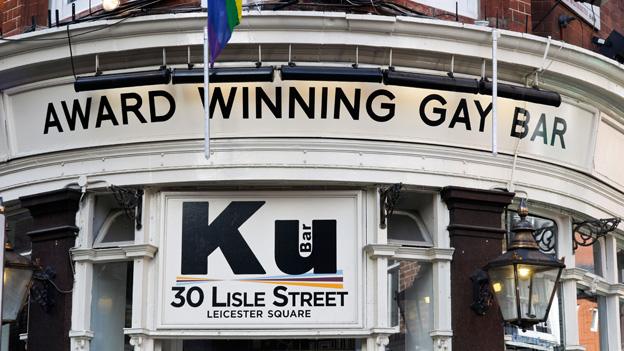Why are London's gay bars disappearing?
- Published
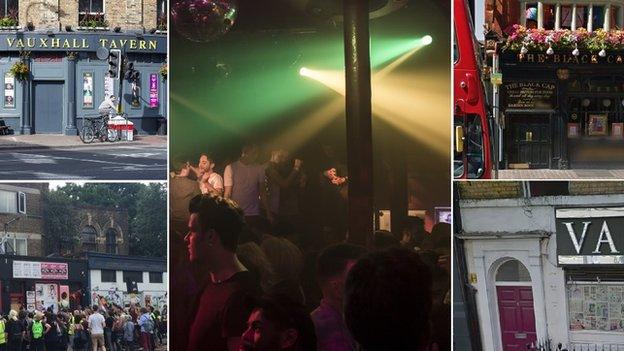
Clockwise from top left: the Royal Vauxhall Tavern, Push the Button at the RVT, the Black Cap, the site of now-closed Candy Bar, and the Joiners' Arms
A string of London's lesbian, gay, bisexual and transgender (LGBT) bars and clubs have closed their doors in the past year.
First Out cafe in Tottenham Court Road, Candy Bar in Soho, the Joiners' Arms and the George and Dragon in Shoreditch, Camden's Black Cap and the Royal Vauxhall Tavern (RVT) are among those to be shut or sold to developers.
What is behind the trend? And what does it mean for the customers?

A more integrated society?
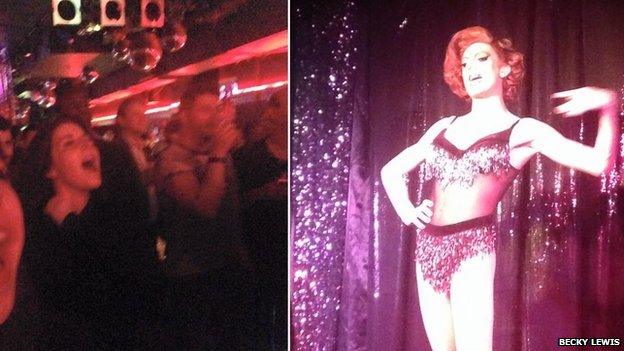
Just a regular night out at the Black Cap in Camden (pictured in January)
Some believe it's a simple supply and demand equation.
The theory goes that society is becoming better integrated, meaning gay people feel more open to visiting "straight bars", lessening the demand for gay-only or predominantly gay venues.
Paul McKeating, 33, from Stoke Newington, says: "Most places in east London or Peckham, where I would go out, feel like safe places to me, and I don't feel there's much point in drawing a line between 'gay' and 'straight' bars."
But Rob Holley, a promoter for nights at the RVT such as Push the Button, disagrees.
The 33-year-old, from Walworth, says: "While it's easier now than ever to be gay, you still have communities that want to celebrate the things that make them different, and why shouldn't we be allowed to do that?
"I first started going to the RVT when I was 18 or 19 and it's as a punter that it will always be most special to me.
"We have events nights ranging from pop exams, to Dannii Minogue musicals, to recreating the Spice Girls' bus tour. Where else could you do that?"
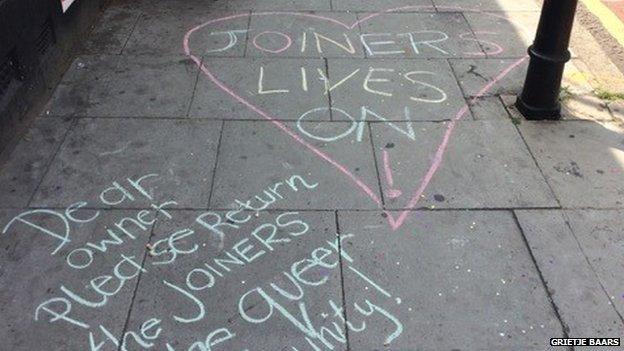
Joiners' Arms supporters make their feelings known in graffiti outside the pub
Dan Glass, 31, from Whitechapel, is an activist with Friends of the Joiners' Arms. He says when he heard it would close he thought: "It's a travesty on so many levels.
"I thought: this is dangerous. We start thinking 'oh we've got equality now' because of gay marriage but still need queer spaces, places where we can celebrate our peculiarities and unpack who we are."
Patrick Strudwick, LGBT editor of BuzzFeed, says: "Since the early 2000s the belief has been held that demand has lessened."
He believes that in London there is "greater integration, and gay people feel more comfortable going to straight bars" than was once the case.
However, he points out that would not necessarily lead to lower demand since "social liberalisation means more young people are coming out and looking for places to go - there's also a big gay scene fuelled by tourists in London".
He also says the Black Cap and Joiners' Arms before they closed were regularly "very, very busy", which he sees as undermining arguments about lack of demand.

Dating 2.0
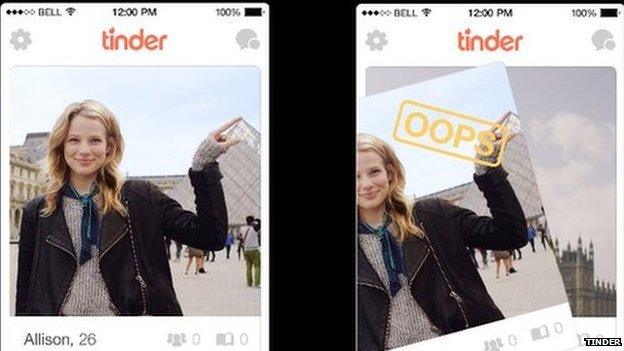
Apps like Tinder and Grindr have been accused of contributing to the decline of gay bars
Mr Strudwick also mentions that the finger is often pointed at the popularity of dating and hook-up apps such as Tinder, Grindr and Gaydar.
In 2013, London was the single most popular city in the world for Grindr, with over 947,000 users.
Web developer Anna Leach, who also runs London lesbian website The Most Cake, thinks the two are related: "It's true that previously you could rock up at a bar and hope to meet someone, but now you can do it at home, sitting on your sofa."
She says there is a sense of "gay identity being dissolved into hipster culture" and an erosion of its visibility and distinctiveness, which could lead to "the loss of a centre and, ultimately, less solidarity".
However, she does not necessarily see the proliferation of online communication as a bad thing for the gay scene.
"It's a chance to develop a community away from alcohol, and develop an interest in more varied types of social activity."
A spokeswoman for Grindr said the app gives users a "multi-faceted choice" and "many of our users, while they're out are also online".

Property mania
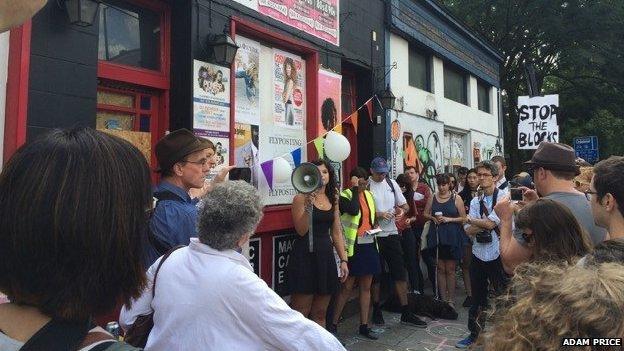
Friends of the Joiners' Arms at an event outside the pub in July
Others have pointed out the loss of these venues need not be seen as a "gay" issue at all, but part of wider trends: pressures faced by all pubs and rising London property prices.
The British Beer and Pub Association estimates that pub numbers have fallen from 60,100 across the UK in 2002 to 48,006 in 2013.
Pub closures are slowing across the UK, according to the BBPA, but common issues affecting pubs in general include "beer taxes amongst the highest in the world" and "changing social lives, with more people drinking at home" .
The Association of Licensed Multiple Retailers (ALMR) reported earlier in August that there are currently 1,733 nightclubs in the UK, down from 3,144 in 2005.
Chris Wiseman, 37, who lives in Crystal Palace, says there is a "bleeding heart" mentality among some of the gay community.
"Dozens of bars and clubs are exposed to the same pressures. When I see people complaining about it on social media, I think 'when was the last time you went there?' People should actually be going down to support these places if they care about them."
But Mr Strudwick says it is not an either-or issue.
"Property prices and rents are indeed out of control - but LGBT people feel disproportionately affected. They don't have hundreds of bars, so when four or five close it's keenly felt."
Peter Cragg from Friends of the Joiners' Arms agrees: "I don't believe there is an evil cabal of property developers hell-bent on locking queers out of London, although that would possibly be easier to fight against."
But he argues: "The most vulnerable in society - whether they are economically or socially vulnerable - are the first victims of gentrification, and queer spaces seem to be disproportionately suffering at the minute.
"The good news is queer communities are no strangers to fighting back, and we aren't going down without a big, glittery, angry fight."

Last orders?
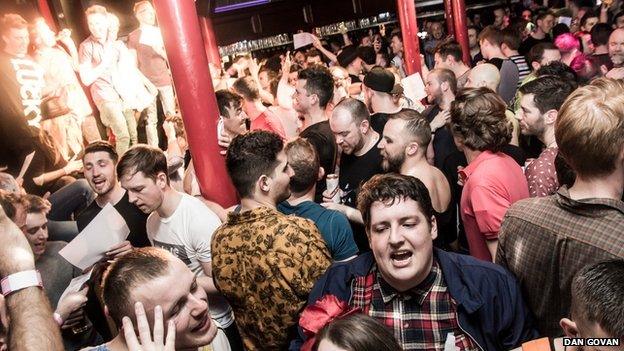
The Joiners' Arms: Campaign group Friends of the Joiners' Arms helped secure the designation of the pub as an "asset of community value" in January. But the current owners are under no obligation to sell it and its status does not place any restriction on how the property is used.
Regal Homes, which bought the pub, says its aim is to "provide an improved community space as part of our regeneration proposals" and adds it has held meetings with Friends of the Joiners' Arms to discuss options.
Royal Vauxhall Tavern: The RVT, which remains open, already has "asset of community value" status, and campaign group RVT Future is lobbying to have the 19th Century Vauxhall venue listed. This would mean that its owners must apply for consent before making changes that might affect its special interest. The Department for Culture, Media and Sport will make a final decision on its status later this year.
Immovate, the company that bought the building, recently wrote an open letter claiming that listing the building would mean "insurance costs would rise overnight by 50%" and as a result it would be "forced to close".
- Published10 August 2015
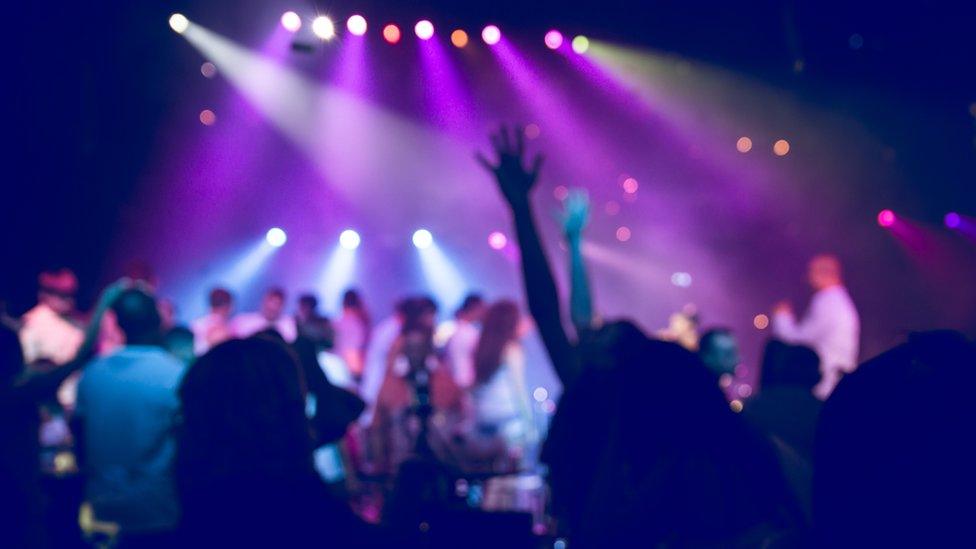
- Published6 March 2015
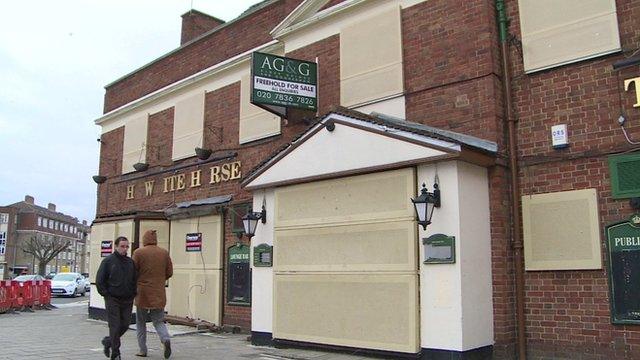
- Published1 April 2014
